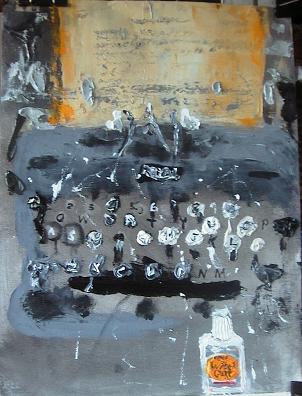The Part About Archimboldi II –The Deaths of Literature
That’s all he wrote. The second half of this novel provides a soft landing for the draining, moving seven weeks we’ve spent reading 2666. While the second half of Part V keeps us at arms’ length from the carnage of the twentieth century in Europe, and the new carnage on the Mexico-US border, it affirms the value of Literature with a capital L while gently, sadly, also making fun of it.
The Part About Arcimboldi I: The Shock of the Fictional
Bolaño seems not to have been sure that these five books actually composed a single book, but until now I had thought the transitions between the four books amazingly smooth (even the shift from Amalfitano to Oscar Fate seemed right to me). But this time the leap from the hyperrealism of The Part About the Crimes to the life of Arcimboldi was very hard for me, which doesn’t mean I’ve disliked this book so far, far from it. It just feels so…novelistic.
The Part About the Crimes II: Watching the Detectives
I said last week (and I appreciate the arguments of people who disagreed with me) that the first half of this Part comes across as not only describing a city’s amnesia in the face of a slowly building horror, but that it also tries to mime that amnesia, containing the facts in forensic vocabulary in short paragraphs while diverting itself and us with the antics of El Penitente, the love affair between Juan de Dios Martinez and Elvira Campos, Florita Almada’s zaniness, etc.. Well, that attitude passes. But the crimes are not solved, so this Part instead becomes an examination of the psychology and motivation of detectives, of why, and what kinds of persons, pursue the truth despite an atmosphere of impunity.
The Part about the Crimes pp.353-493: (Un)Focusing Our Attention
All the hype about this book, and (in the one-volume, 890pp. version) all the preparation in the previous sections, have been to tell us that this section is about the murders of the women of Santa Teresa/Ciudad Juarez. So why does our omniscient narrator seem to have trouble focusing on them?
The Part About the Crimes 1: How Factual Is All This?
I’m about 20 pages from finishing the half of Part 4 we’ve committed to for tomorrow. For now let me suggest some places to go to see how closely the novel matches up with the facts of the Ciudad Juarez femicides, insofar as they have been determined.
Is 2666 a “Total Novel”?
No one pays attention to these killings, but the secret of the world is hidden in them.
–“The Part About Fate,” 2666, p.348
The question of whether 2666 is a total novel seems interesting enough for its own thread. I’m going to copy out below what we’ve discussed so far (mostly in the thread on The Part About Amalfitano) in hopes that we’ll continue the discussion in comments, and maybe glean enough insight for another blog post later — or figure out that the question merits revision. Continue reading
2666: Where Everybody Knows You’re Nobody
2666, “The Part About Fate,” p 283:
As he waited by the highway for three trucks to go by on their way from Santa Teresa to Arizona, he remembered what he’d said to the cashier. I’m American. Why didn’t I say I was African American? Because I’m in a foreign country? But can I really consider myself to be in a foreign country when I could go walking back to my own country right now if I wanted, and it wouldn’t eve take very long? Does this mean that in some places I’m American and in some places I’m African American and in other places, by logical extension, I’m nobody?
Identity is relative; it’s what distinguishes you from those around you. And the closer you get to home, the less identity you have to have.
Continue reading
The Part About Fate: Plots
Since this is the last part of the novel that I read two years ago before I got distracted (and daunted by the length of the next two parts), I already knew that I really liked this part, but wouldn’t have a lot to say about it; probably that’s why I did a separate post about Amalfitano earlier this week. When I like narrative but don’t have a lot to say about it, that’s because I’m attracted to its plot.
The Part About Amalfitano: Madness is Contagious
As life imitates art, I read this section in the isolated provinces, rural Ohio; the isolation I often feel in the summers of Oberlin can feel a lot like this section, almost entirely inside the Chilean exile Amalfitano’s head. Arguably, this section is about the tricks that loneliness can play on a person, those poor “chincuales” who “cannot sit still mentally” (200).
PS to Part One of 2666
Tonight I start in on Part Two, which I expect to do a mid-week blog post about (we’re doing both Parts Two and Three in a single week, remember.) But I did want to point out a creepy exception to one of the rules I suggested for the novel, in Part One. Continue reading
